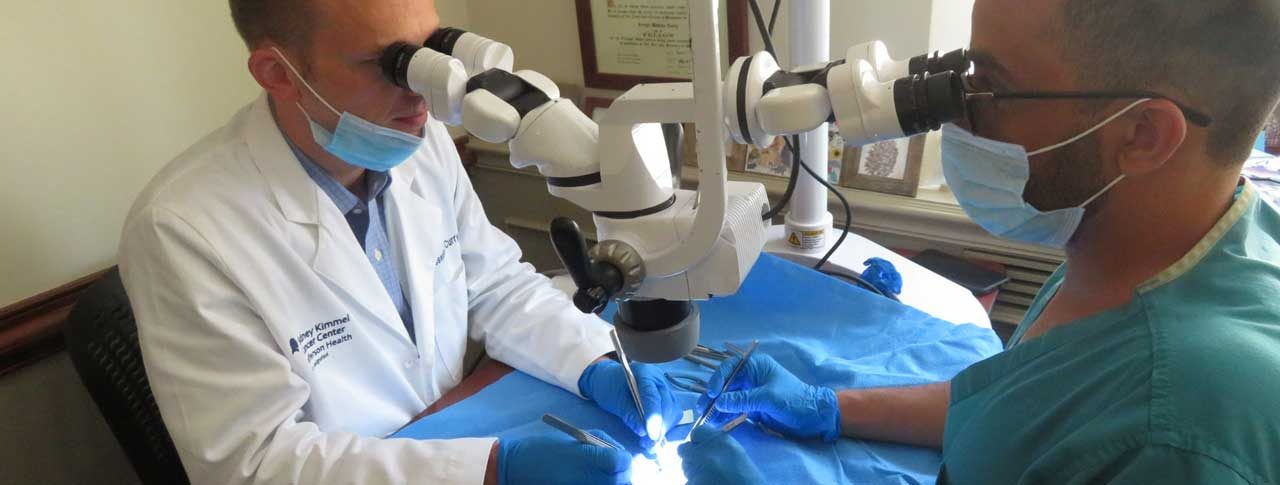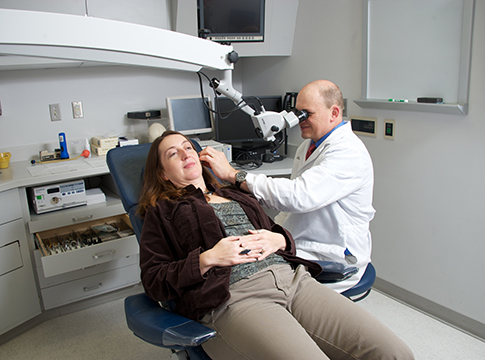The Otolaryngologist’s Role in Diagnosing Complex Head and Neck Conditions
The Otolaryngologist’s Role in Diagnosing Complex Head and Neck Conditions
Blog Article
Exploring the Field of Otolaryngology: What to Expect When You Consult an ENT
Otolaryngology, generally described as ENT, incorporates the medical diagnosis and therapy of throat, nose, and ear problems. For those experiencing associated problems, getting in touch with an ENT specialist can give clearness and alleviation. Understanding what to expect throughout such examinations is crucial for effective communication and care. This introduction will certainly outline vital facets of the ENT experience, consisting of common reasons for brows through and the processes associated with diagnosis and treatment.

Comprehending Otolaryngology: An Overview
Otolaryngology, typically described as ENT (Throat, ear, and nose) medicine, is a specialized branch of medicine that concentrates on the medical diagnosis and treatment of problems affecting these crucial areas of the body. This field incorporates a wide variety of problems, including those pertaining to hearing, balance, respiratory system function, and speech. Otolaryngologists are trained to manage both clinical and surgical therapies, making use of innovative techniques and technologies. Their know-how expands beyond typical conditions, addressing concerns such as allergies, sinus infections, and hearing loss. Additionally, they play an important function in the management of head and neck cancers cells, offering detailed care tailored to private client requirements. Overall, otolaryngology continues to be necessary for keeping wellness and top quality of life in damaged people.
Common Factors to See an ENT Expert
Many people look for the expertise of an ENT specialist for a selection of factors, reflecting the diverse nature of conditions that affect the ear, throat, and nose. Typical concerns include persistent sinus problems, which typically brings about persistent nasal congestion and facial pain. Allergies and their linked signs and symptoms, such as sneezing and itching, likewise trigger brows through to these specialists (ENT). Hearing loss, whether steady or sudden, is an additional substantial reason for consultation. Additionally, individuals may look for assessment for throat problems, consisting of relentless hoarseness or ingesting problems. Rest apnea, characterized by cut off breathing throughout rest, is regularly dealt with by ENT experts. Each of these conditions highlights the relevance of specialized care in managing intricate ENT-related wellness problems
Planning for Your ENT Consultation
When preparing for an ENT appointment, it is essential to collect appropriate info and consider any particular worries. Individuals must put together a comprehensive case history, consisting of previous ear, nose, or throat issues, surgical treatments, and current drugs. Recording symptoms-- such as duration, extent, and regularity-- can offer important understandings for the ENT expert. In addition, individuals need to prepare a list of concerns they wish to ask, making certain that all concerns are attended to during the check out. Bringing along any type of relevant clinical records or examination outcomes can better aid the ENT in recognizing the person's condition. People need to validate their consultation information, including time, day, and place, to decrease any kind of final complication. Appropriate prep work can improve the performance of the consultation and cause much better end results.
What to Anticipate Throughout the Consultation
As the assessment starts, the client can anticipate to take part in an extensive conversation with the ENT expert about their symptoms and clinical background. The professional will certainly ask about the duration, frequency, and seriousness of symptoms such as hearing loss, nasal blockage, or sore throat. Additionally, the client's previous clinical problems, medicines, and any pertinent family history will certainly be reviewed, aiding the professional in creating a full understanding of the client's health and wellness. The ENT might also ask regarding lifestyle factors, such as exposure to irritants or irritants. This open discussion establishes a structure for the examination, making certain that the patient's concerns are dealt with and setting the phase for any kind of essential evaluations or referrals for treatment.
Diagnostic Examinations and Procedures in Otolaryngology
An array of analysis tests and treatments are vital in otolaryngology to properly assess and diagnose problems impacting the ear, throat, and nose. Common tests consist of audiometry, which gauges hearing function, and tympanometry, assessing middle ear stress. Nasal endoscopy enables visualization of the nasal flows and sinuses, while laryngoscopy examines the throat and singing cables. Imaging strategies, such as CT scans and MRIs, supply in-depth views of head and neck structures. Allergic reaction screening might likewise be conducted to recognize triggers for sinus or respiratory concerns. These diagnostic tools enable my review here ENT specialists to develop a detailed understanding of clients' problems, making sure tailored and efficient administration strategies. Proper diagnosis is necessary for successful treatment end results in otolaryngology.
Treatment Options Provided by ENT Specialists
ENT experts supply a variety of treatment options customized to resolve specific problems influencing the throat, ear, and nose. These therapies vary from conventional techniques, such as medication and way of living alterations, to more invasive treatments. As an example, allergic reactions might be managed with antihistamines or immunotherapy, while chronic sinusitis may call for nasal corticosteroids or sinus surgical procedure. For hearing loss, ENT professionals frequently recommend hearing help or surgical treatments like cochlear implants. In instances of throat problems, options can consist of speech treatment or medical procedures to get rid of obstructions. In addition, they might supply assistance for managing rest apnea, including making use of CPAP tools or surgical interventions. In general, the objective is to enhance clients' lifestyle with personalized care and reliable therapy techniques.
When to Look For Follow-Up Treatment With an ENT
When to seek follow-up care with an ENT expert is essential for handling recurring signs or problems connected to nose, ear, and throat problems, acknowledging. Clients should take into consideration arranging a follow-up consultation if symptoms persist regardless of initial treatment, such as persistent ear discomfort, nasal congestion, or throat pain. Adjustments in hearing, balance issues, or uncommon nasal discharge may also require more analysis. In addition, if a client experiences side effects from prescribed drugs or has undergone an operation, follow-up treatment is necessary to monitor healing and attend to any kind of concerns. Prompt assessments can guarantee efficient management of conditions, avoid prospective problems, and offer comfort concerning one's wellness. Looking for follow-up treatment promotes proactive wellness administration linked here in otolaryngology.
Frequently Asked Inquiries

What Credentials Should I Look for in an ENT Specialist?
When seeking an ENT professional, one need to search for board qualification, pertinent experience, and strong individual evaluations. In addition, effective interaction skills and a compassionate method can substantially boost the general therapy experience.
How Do I Select the Right ENT for My Requirements?
Picking the appropriate ENT specialist includes assessing their credentials, experience, and patient reviews (Otolaryngologist). It is necessary to consider their communication style and method to therapy, ensuring they align with the person's specific health and wellness requirements and preferences
Exist Any Type Of Dangers Related To ENT Procedures?
The risks associated with ENT procedures may include infection, blood loss, anesthesia issues, and potential damages to bordering frameworks. Patients need to talk about these threats with their physician to comprehend individual concerns and assurance notified choices.
How Can I Take Care Of Anxiety Prior To My ENT Visit?
To handle anxiety before a visit, individuals can exercise deep breathing exercises, picture positive outcomes, prepare inquiries in breakthrough, and look for assistance from pals or family, fostering a sense of peace of mind and calmness.
What Should I Do if I Experience Negative Effects From Treatment?
The individual ought to promptly report them to their health care supplier if side impacts from therapy take place. Changes to treatment or added interventions may be required to ensure safety and performance in managing his comment is here their problem - Hearing. As the assessment begins, the client can expect to engage in a comprehensive conversation with the ENT professional regarding their symptoms and medical background. These diagnostic devices allow ENT professionals to develop a detailed understanding of patients' conditions, guaranteeing customized and effective management plans. ENT experts supply a variety of therapy options customized to resolve details problems influencing the throat, nose, and ear. When seeking an ENT expert, one should look for board certification, pertinent experience, and strong individual evaluations. Selecting the right ENT expert entails evaluating their credentials, experience, and patient testimonials
Report this page